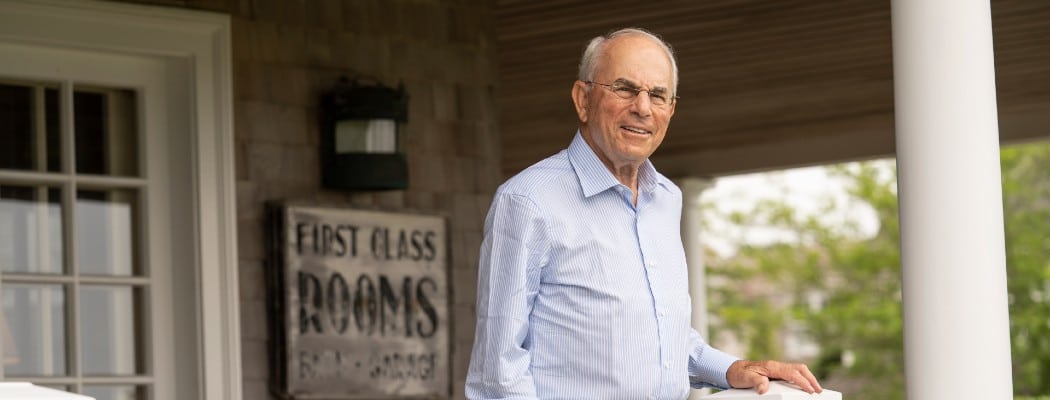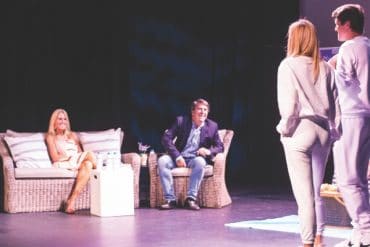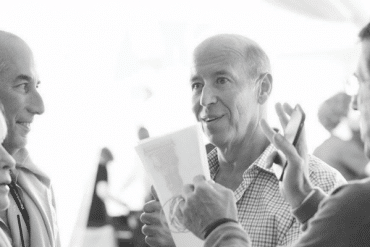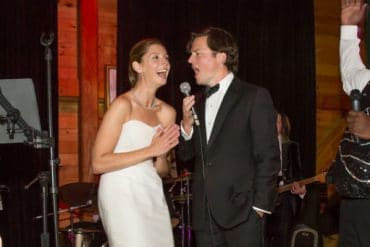How Ed Hajim overcame staggering odds to achieve the American Dream.
If adversity builds character, then Ed Hajim has one made of granite. Abandoned by his mother at the age of three, kidnapped by his father who informed Ed that his mother had died, and thrown into the foster care system, Hajim experienced a childhood marked by unimaginable heartbreak. Miraculously, he endured through the turmoil and emerged as a highly successful businessman and community leader. Today, Hajim is a devoted husband and father who has given generously to the institutions that helped him along the way. The founder of the Nantucket Golf Club, Hajim and his wife of fifty-five years, Barbara, have been coming to Nantucket for decades. In his new autobiography On the Road Less Traveled—which he will be discussing at an event this August at the Nantucket Atheneum—Hajim details how he willed himself from being a vulnerable and frightened child to a highly successful man unto himself. The twists and turns of Hajim’s life chronicled in his book border on disbelief and give meaning to the term “self-made man.” N Magazine sat down with Ed Hajim to discuss his memoir and his remarkable lessons of resiliency.
Some people look back at their childhoods and think about the inevitable disappointments. They didn’t get the red bicycle they wanted or their family couldn’t afford the vacations that their friends went on. Yet, for you, disappointment in childhood had an entirely different meaning. What was childhood like for Ed Hajim?
When my parents got divorced, my mother basically took me back to her home in St. Louis, where she was not welcome. This was 1939. People were poor and they didn’t need another two more mouths to feed. Meanwhile my father couldn’t live without me. He got visiting rights on Sundays. When he came to St. Louis, he found me in what he thought was an unkempt environment. So instead of taking me to the playground, he got on Highway 66 and drove me back to Los Angeles. Basically, he kidnapped me. During the two-year period we were together, he was away about half the time as a merchant marine. He contacted a local Catholic welfare agency that found me a foster home. That ended up being the first of five foster homes I lived in over almost five years.
 When you entered the foster home system, you had to find something in yourself to maintain your sanity. Did you recognize some inner strength at that point or was it just survival on a day-to-day basis?
When you entered the foster home system, you had to find something in yourself to maintain your sanity. Did you recognize some inner strength at that point or was it just survival on a day-to-day basis?
Complete survival. I was five when my dad left me. We had a very good relationship. We were buddies for those two years. When he left me it was crushing. I actually got sick when he left me. He left me with people who really didn’t care. In those days, people were poor, and they took in someone like me just for the money. This particular first family was of that character. I could tell right away that it was cold and not feeling. That was a big blow. I could still remember the moment my dad left.
The relationship with your father was, at a minimum, complex. How were you able to resolve being abandoned by not just one parent, but both? How does one process this?
Well, one doesn’t, really. As a child, you’re surviving. And children have enormous capability to do that. But my father loved me. He loved me more than anything else in the world. And that idea sustained me to some extent. I always credit that as what got me through most of my years, regardless of abandonment, kidnapping and all that kind of stuff—there was unconditional love. His letters to me always said, “You’re the best.” And that’s one of the messages that I think people have to send to their children. When you’re a parent, it is unconditional love, no matter what the person is. I have done that with my children, because some of my children weren’t so easy either.
 Your father informed you at an early age that your mother had died. Why do you suspect he did that?
Your father informed you at an early age that your mother had died. Why do you suspect he did that?
He and my mother obviously did not get along. Although I am not sure why he did it, I suspect he never wanted me to know her. He was very angry that she left him.
As time went on, you began to develop a sense of self. Were your survival skills based on fear of failure or fear of rejection? Or was there an innate sense of optimism in you that was able to move yourself forward?
Both really. The disadvantages became advantages. Think of yourself arriving in four or five different school yards. You had to figure out where you fit in, who’s going to beat you up or who you’re going to beat up. You learn adaptability pretty quickly. You learn a sense of how to get along. It was the same when I went to the orphanage; there were rites of passages there. But I also had a sense of optimism for whatever reason.
You were enrolled in parochial school and were almost confirmed as a Catholic. Later on as a teen, you discovered that you were Jewish. Can you explain what going through the parochial school system meant to you and a little bit about this experience?
I was about to be confirmed, but my father returned. I asked my father about my baptismal papers, but obviously there were none. I remember my parochial school as excellent, but very strict with services twice a day. They drilled the basics into you and put the fear of God into you if you did anything wrong. In addition to using the ruler on your knuckles, it was a solid foundation for me.
 Explain the leap from high school to how you came to attend the University of Rochester. How did that happen?
Explain the leap from high school to how you came to attend the University of Rochester. How did that happen?
My father completely disappeared. I ended up in this orphanage in Yonkers, which was four blocks from a really good high school, Roosevelt High School. About 80 percent of the kids there went to private colleges. I got this idea that a private college was my ticket out. I was going to do whatever I needed to do to get into a private college, even though I couldn’t afford it. I had to get a scholarship. In those days, there were very few scholarships. There was the New York State scholarship, which I was sure I was going to get but I didn’t. Then I applied for the NROTC scholarship. They give out twelve hundred of them in the country. I remember the letter said, “You’ve been rejected.” Typical government letter. Then there were three or four paragraphs describing what the scholarship was, and then the final paragraph said, “You’re an alternate, and your number is high enough that you will get the scholarship.” So how did I get out of it? That got me out of it. But that was really just the start.
When did your early business inclinations begin?
In my junior year, I created a humor magazine. I didn’t know it at the time, but I really found my passion, which was to put people together to solve a problem, create a program or a product. I really got a kick out of watching people and helping people do better than they thought they could. So I found my passion.
Explain how you went from the University of Rochester to the best business school on the planet.
I got accepted to Berkeley after I got out of the Navy. I decided I’d work my ass off to become a chemical engineer. I gave that a year [working at a company called Hercules]. I was then going to Wharton at night and I had a friend from the Navy who was studying at Harvard. He said, “You got to come here.” I said, “I don’t have the grades or the money.” But he would not leave me alone about it, so I spent a couple days with him during Christmastime. Harvard looked really interesting. I applied to Harvard Business School and one of the Navy captains wrote me a letter that basically said I walked on water. Getting accepted to the West Point of Capitalism was the second ticket upward.

Given the incredibly difficult circumstances of your childhood, were you able to look yourself in the mirror after being accepted to Harvard and say, “You know, I’m pretty good”?
No, not even today. No, when I went to Harvard I basically made the biggest bet in my life. I took out all the money I had in the world to pay the tuition. I could have flunked out. In those days, they’d give the impression they were going to flunk you out. If I didn’t make it, what the hell would happen to me? Not even in the end of the second year, when I was looking for a job and there were people giving me offers, did I look back. Because as a child, to survive, you always looked ahead at what’s next. There’s no end zone. I try to get this across to young people in the book: Never be a victim; always look at what’s next. The energy you use in being a victim is destructive. You only have a certain amount of energy a day; why not use it to figure out how to get out of this problem?
 Your business career is expansive and there’s a lot of nuance and a lot of detail, but what led you to the investment world?
Your business career is expansive and there’s a lot of nuance and a lot of detail, but what led you to the investment world?
The reason I changed from engineering to investing was pretty simple. First of all, when I was working at Hercules, I saw people lose their jobs after twenty years because their technology went out. I said, “Oof, that’s not good.” When I got to the business school, I fell in love with just running something. I went into the investment business because that was a chance for me to look at all kinds of companies. At Capital Research I became an investor and received a Ph.D. in investing. At Hutton, I learned all about the brokerage business. Then I went to Lehman and I learned about everything else, including what not to do. So I used all those capabilities, twenty years in the business, to become the CEO of a small investment bank and grew it for twenty years.
If you had been brought up with a conventional middle-class background and did not suffer and have the challenges that you had, do you think you would be as successful today?
I don’t know. It’s a real question. That’s why I recommend people have their children be uncomfortable. Send them to Outward Bound; send them to NOLS [National Outdoor Leadership School]. Get them a job washing dishes, working in a mental hospital. Get them to be alone. Because my greatest strength was that I was not afraid of being alone or failing.

You have built a family and created an enormous amount of stability. How did you go from that kind of upbringing to the life you’ve created?
Family was something I always took time out to do because I thought that was the legacy I really wanted more than anything else. My wife Barbara has done the job on the family side completely. You have to find someone like that. Find someone to love, someone you can support, someone who you can share your life with, someone who’s willing to tell you that your shirt’s not tucked in. It’s very important. Marrying Barbara was my best decision by far.
When you were in your mid-fifties, you reunited with your mother. What did that experience teach you?
The first thing you get with reuniting with your mother is you get the other half of who you are. I arrived at her apartment in St. Louis and I rang her doorbell and said, “I’m your son, fifty-seven years late.” When I met her that day, there was no emotion, initially. Three hours into it, we got pretty emotional. I spent twelve wonderful years with her. I found out the other half of me, and she gained a whole family, which made me feel good.
Ed Hajim will be discussing his memoir On the Road Less Traveled at the Nantucket Atheneum on Monday, August 2nd at 7 p.m.







